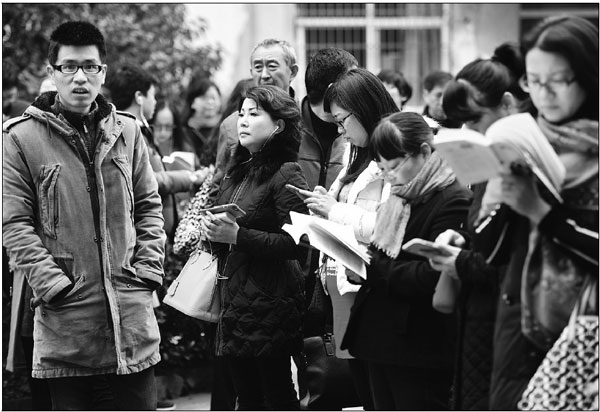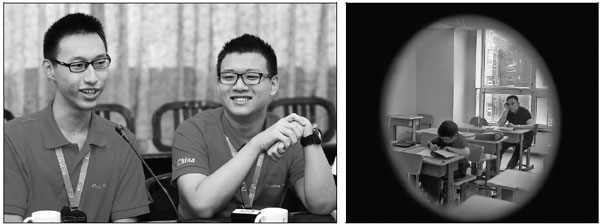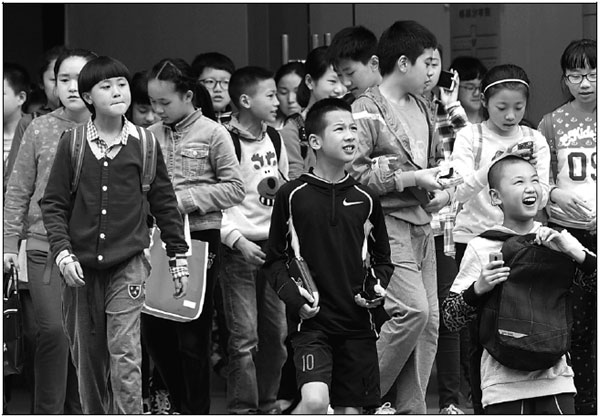PARENTS WRESTLE WITH MATH PROBLEM
Ban on coaching for international contests challenged
News that China finished in sixth place at the 2019 Romanian Master of Mathematics, an international contest held late last month in Bucharest, the Romanian capital, caused barely a ripple in academic circles.
Neither did the fact that none of the six Chinese contestants won a gold medal at the Olympics-style event.
But China made significant progress in the renowned contest - which to many observers is more difficult than the International Mathematical Olympiad - after finishing 13th in 2013 and 12th in 2016 in Romania.
Still, this year's result was described as an embarrassing defeat by some parents who have questioned the Ministry of Education's ban last year on extracurricular coaching for Olympics-style contests, and even claimed that China has generally fallen behind in mathematics.
The Romanian competition is an annual six-problem mathematical event for students before they attend college. The first contest was held in Bucharest in 1959, and it has since been held annually, except for 1980. More than 100 countries, representing over 90 percent of the global population, send teams of up to six students, plus one team leader, a deputy leader and observers.
Late last year, the ministry's ban on coaching for Olympics-style math competitions was strictly enforced nationwide - in response to calls to ease the academic burden on children. Some parents and nearly all students attending coaching sessions breathed a sigh of relief, as it heralded the end of difficult, and sometimes weird, mathematical problems.

But many parents who think that the ban goes too far still hope their children can continue to receive coaching after school that will lead to them gaining admission to key academic institutions.
In addition to stopping the coaching, the ministry halted all national math contests for primary school students. Some of these contests date to the 1980s.
This, in effect, shut the door for the coaching agencies. Previously, first-prize winners in some of the contests could be enrolled directly by leading junior middle schools without taking enrollment exams.
Despite the ban, there is still an annual national league math competition for high school students in which the first-prize winners are sought by leading universities. Those who make the final 30-strong pool for the national team can directly obtain offers from key universities without sitting the gaokao, the national college entrance exam.
Tian Run, the mother of a second-grade student in Jinan, Shandong province, arranges her daughter's after-school timetable with precision. "I don't think she is sufficiently gifted to make the national team pool, but she needs to learn Olympic math and some other extracurricular courses," she said.
"This helps to develop pupils' intelligence at an early age. Their efforts will pay off some time in the future."
Tian said her daughter, who spends nearly all her time after school and during weekends on extracurricular coaching, ranging from math to piano lessons, enjoys living a full life.
Zhao Le, a father in his mid-40s whose son attends a leading junior middle school in Beijing, said: "Before the ministry's ban, almost all the students in my son's class attended extracurricular coaching in Olympic mathematics, which is a major subject. A child would be an exception if he or she did not receive this extra training."
Zhao, who attaches great importance to his son's education, supports children studying for the IMO as long as their parents can afford it.
High earnings
Coaching sessions for the IMO are expensive. After the ministry's ban was introduced and agencies halted coaching sessions, some parents banded together to employ teachers - usually from key public schools - to teach their children at home.
Although teachers are not allowed to take such paid part-time work, many are making additional money by holding clandestine coaching sessions.
A top math teacher taking a class of five to 10 students can earn about 3,000 yuan ($447) per hour from freelance work in first-tier cities such as Beijing and Shanghai. Some can make millions of yuan a year from such work, according to parents.
No teachers holding coaching sessions were willing to be interviewed.

Yang Dongping, head of the 21st Century Education Research Institute, wrote in a post on his WeChat account, "The ministry's ban has nothing to do with the Chinese team's performance in the competition in Bucharest last month.
"The ban is necessary, as it aims to relieve the burden on students and prevent a business mentality from disturbing the normal educational order."
Zhao Bin, a math teacher at Hangzhou No 2 Middle School in Zhejiang province, who has coached IMO gold medalists for the national team, told media outlets: "The Chinese team's performance in Romania this year reflects some problems that need coaches' attention. Still, it is natural for a country's performance to fluctuate. People should not make a big deal about it."
As all six members of the team are from three schools in Shanghai, it is more rational to refer to them as a Shanghai team, Zhao said.
The six were chosen from a pool of 30 selected from a 180-strong training camp, and were picked through a national math league match. Some 100,000 students take part in these matches nationwide.
Experts said it is unreasonable to take China's ranking in the IMO or the Romanian contest as a reference point for the level of math nationwide.
For instance, the IMO is not popular in France, but that country is an advanced nation in math, with dozens of Fields Medal winners. The Fields Medal, known as the Nobel Prize in mathematics, is awarded by the International Mathematical Union every four years.
Teaching comparisons
The popularity of after-school coaching in math, which taps parental anxieties that children will fall behind academically, provides an opportunity to compare the concepts and methods of math education between China and other countries.
Yang Le, a mathematician and an academician with the Chinese Academy of Sciences, said, "The extracurricular Olympic mathematics coaching for primary school students is more like 'mathematical acrobatics', and does not help develop real mathematical thinking. High school is the ideal stage on which to arouse young people's interest in math."
Shing-Tung Yau, a Chinese-American mathematician, told media outlets the crux of math education does not hinge on how many IMO medals a country wins, but on whether students have developed their interest and independent thinking on the subject. He fears that math contests are "strangling genius".
Zuming Feng, who used to instruct the Chinese IMO team and now coaches the United States squad and is a math instructor at the Phillips Exeter Academy in New Hampshire, compared the differences in mathematical education in China and the US.
He said most Chinese children are used to waiting for teachers to give them the formula to solve problems. They do not like creating their own solutions, and usually do not know how to deal with new problems without formulas.
"I have seen too many Chinese students score high marks in exams but who are weak when it comes to solving problems. There are also some 'quasi-geniuses' who can come up with simpler and better solutions to even difficult IMO questions than the standard answers, because they have not been institutionalized by the exam-oriented educational system," Feng said.
He advocates engaging students in problem-solving math activities to arouse their interest and encourage them to seek solutions independently, enabling them to develop as "critical thinkers of tomorrow's problems".
Po-Shen Loh, professor of mathematics at Carnegie Mellon University in Pittsburgh, Pennsylvania, and a coach of the US IMO team, told China Youth Daily that the different math teaching methods in China and the US stem from cultural differences.
"In the US, there are no unified enrollment exams for middle school and university ... so the education focuses more on exercising students' thinking ability."
The exam-oriented math teaching method in China requires students to do exercises covering all knowledge points continuously, until they are fully proficient.
To obtain an advantage over their peers in competitive enrollment exams, many students attend extracurricular classes, and it is common to see pupils in middle schools or even primary schools studying advanced mathematics for college students.
Yang, from the 21st Century Education Research Institute, urged Chinese parents to reflect on their "blind confidence" in students' advantages in math over their Western counterparts. He said such advantages can only be seen at primary and middle schools, and come at great cost, as they deprive students of the initiative to look for solutions independently.
"It is a pity that many children lose their interest in math at an early age because of jumping the gun by attending coaching sessions. Even gifted students who can handle the IMO have 'lost their originality' to the modularized coaching system," Yang said.
Exam failures
Fu Yunhao, an IMO gold medal winner in 2002 and 2003 and a math instructor at Guangdong University of Education in Guangzhou, the provincial capital, was highlighted last year by People magazine as an example of the failure of the intensive math education model. The magazine reported Fu's academic "decline".
He has not completed his bachelor's in math at Peking University, which exempted the IMO champion from admission exams in 2003 after he twice failed to pass the physics exam.
The magazine report, which irritated Fu, depicted him as a loser who lived a "genius fantasy existence" until it was too late to realize there was more to life than the IMO.
Fu said in a post on his WeChat account, "It is hard to understand the reporter's assessment that a common school post is a humiliating job for an IMO champion."
He also said working as a teacher at a normal university is the best way to maximize a contribution to society.
Xiong Bingqi, a freelance educational worker, said it was time China reformed its talent assessment and enrollment system to play down the importance of exam scores. Then, young people could better focus on their interests while developing practical problem-solving abilities, enabling individual talent to be better harnessed.
"Solely banning IMO coaching for primary school students is far from solving the problem," Xiong said.
There have been increased calls among the public that, as China strives to build an innovation-driven economy, it must reform its educational system, and math should be the first subject to be addressed.
Zhang Jie, a think tank researcher on economic and social development with CITIC Group, said: "Now is the time to minimize the shortcomings of the old system. We can draw lessons from teaching methods in the US to prompt students to focus more on the logical thinking methods and fun behind mathematics. That's the foundation for advanced mathematics and the wider application of math in other fields.
"It certainly does not mean China's original math teaching method is wrong. Instead, it is very effective and efficient in eliminating mathematical illiteracy at a primary level among a large population."
liyang@chinadaily.com.cn
|
Parents wait outside a school in Hangzhou, Zhejiang province, in 2016, where the first round of the Hua Luogeng Golden Cup Mathematics Invitational Competition was held. The contest, launched in 1986, aims to encourage young math talent. Long Wei / For China Daily |
|
Left: Two IMO gold medalists from the high school affiliated to South China Normal University in Guangzhou, Guangdong province, smile after the contest held in Rio de Janeiro, Brazil, in 2017. Feng Zhoufeng / For China Daily Right: A one-on-one coaching session is held in Beijing with the father sitting behind his son. Li Jianguo / For China Daily |
|
Primary school students finish a national Olympic mathematics competition in Chengdu, Sichuan province, in 2016. Liu Chenping / For China Daily |
(China Daily 03/28/2019 page1)





















